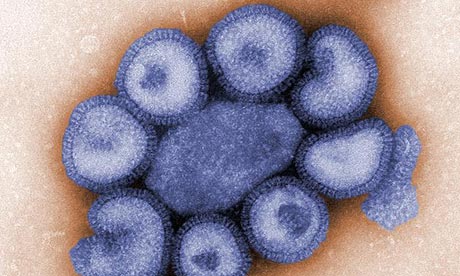
The world's first human trials of a swine flu vaccine have begun in Australia, drug company officials said today, as the global death toll from the virus rose to 700.
Two biotechnology companies have started injecting adult volunteers in the southern city of Adelaide. CSL, a Melbourne company, has 240 people in its seven-month trial starting today. Vaxine, from Adelaide, began trials on Monday with 300 people.
At least 41 people have died in swine flu-related illness in Australia, now well into its winter flu season.
"We're in the southern hemisphere, and that is where the problem is right now," Vaxine's research director, Nikolai Petrovsky, said. "The demand was here yesterday. We're right in the middle of a surge of swine flu cases where perhaps the US won't have to worry about it as much until their flu season hits, in six months."
Australia had confirmed 14,703 cases of swine flu, while the number of deaths from the virus globally is more than 700, according to the World Health Organisation, which recently stopped counting the number of cases worldwide. A surge in cases is predicted in September and October, when students and workers in the northern hemisphere return from summer vacation.
The Australian government has already ordered 21m doses of CSL's vaccine for use in Australia, should it be proved to work.
"We have a specific vaccine that we believe will be able to protect millions of people against this new H1N1 flu," Andrew Cuthbertson, CSL's director of research and development, told reporters. He called swine flu "a novel strain of influenza", and said the trial would determine the dose and schedule of the vaccination.
Petrovsky said it would be six to eight weeks before results would verify whether a vaccine was effective.
"There is no guarantee any of these vaccines will work," he said. "Swine flu is a very peculiar beast. It is a very different virus that we're dealing with. But we are hopeful."
Medical experts warned against rushing the vaccines through trials.
"I think it's important for the public to know that they're going to get a safe and effective vaccine," Andrew Pesce, president of the Australian Medical Association, told Sky News television. "No one will give anybody brownie points for putting out a vaccine that didn't work or caused harm."
In Britain, the UK's health protection agency (HPA) estimates there were 55,000 new cases of swine flu in England the week before last, including people visiting GPs and those who are looking after themselves at home.
The British pharmaceutical giant, GlaxoSmithKline, said in May it had agreed to supply nearly 130m doses of the swine flu vaccine to the UK, France, Belgium and Finland. It also said it would donate 50m doses to developing countries. The vaccine is expected to come before the end of the year.
Glaxo is one of several companies charged with producing a vaccine for H1N1 after the outbreak of the virus was declared a pandemic last month.

